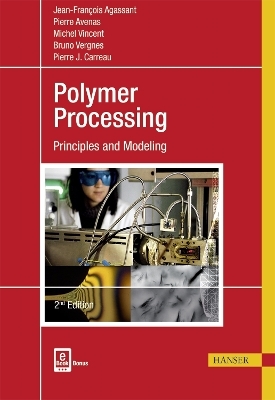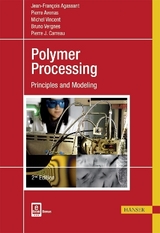Polymer Processing
Hanser Publications (Verlag)
978-1-56990-605-7 (ISBN)
Zu diesem Buch erhalten Sie kostenlos ein eBook dazu.
The necessary physical concepts such as continuum mechanics, rheological behavior and measurement methods, and thermal science with its application to heating-cooling problems and implications for flow behavior are analyzed in detail. This knowledge is then applied to key processing methods, including single-screw extrusion and extrusion die flow, twin-screw extrusion and its applications, injection molding, calendering, and processes involving stretching.
With many exercises with solutions offered throughout the book to reinforce the concepts presented, and extensive illustrations, this is an essential guide for mastering the art of plastics processing. Practical and didactic, Polymer Processing: Principles and Modeling is intended for engineers and technicians of the profession, as well as for advanced students in Polymer Science and Plastics Engineering.
With the purchase of this book, you also receive a free personal access code to download the eBook.
Jean-François Agassant is Head of the Material and Mechanical Engineering Department at MINES ParisTech and head of MINES ParisTech in Sophia-Antipolis. Pierre Avenas is former Director of the Center for Material Forming (CEMEF) of MINES ParisTech and held several senior positions in French government research policy and in industry, notably managing R&D Chemistry at Total Group until 2004. Pierre J. Carreau is Emeritus Professor at the Ecole Polytechnique of Montreal Bruno Vergnes is Research Director at the Polymer and Composites research unit of the Center for Material Forming (CEMEF) of MINES ParisTech and an expert in rheology and extrusion processes. Michel Vincent is CNRS Research Director at the Polymer and Composite research unit of the Center for Material Forming (CEMEF) of MINES ParisTech and expert in injection molding and composite processing.
Introduction Chapter 1: Continuum mechanics - Review of principles Strain and rate of strain Stress and force balance General equations of mechanics Chapter 2: Rheological behaviour of molten polymers The Newtonian behaviour, Navier-Stokes equation Shear Thinning behaviour Behaviour of filled polymers Viscoelasticity of polymeric liquids Measurements of rheological behaviour Chapter 3: Energy and heat transfer in polymer processing Basic notions of energy Heating and cooling cases Temperature changes in polymer flows Chapter 4: Approximation and computation methods General equations for polymer processing How to choose a relevant constitutive equation Boundary conditions Approximation methods Pressure build-up mechanisms Computation methods Chapter 5: Single screw extrusion and die flows Single screw extrusion Extrusion dies Coextrusion Chapter 6: Twin-screw extrusion: description and application General description of the twin-screw extrusion process Solid conveying and melting Molten polymer flow Global model of the twin-screw process Polymer blend processing Compounding Reactive processing Optimization and scale-up Conclusion Exercise: simplified calculation of the flow in a mixing element Chapter 7: Injection moulding Presentation Filling stage Packing stage Residual stresses and strains Non-standard injection moulding processes Injection moulding of short fibres reinforced thermoplastics Conclusions Exercises Chapter 8: Calendering Introduction Thermo-mechanical analysis Post-extrusion calendering Chapter 9: Polymer fibres and films Introduction Fibre spinning Biaxial stretching Cast-film process Blown film Blow moulding Chapter 10: Flow instabilities in polymer processes Extrusion instabilities Coextrusion instabilities Calendering instabilities Drawing instabilities
| Erscheinungsdatum | 11.04.2017 |
|---|---|
| Sprache | englisch |
| Original-Titel | Mise en forme des polymères (4°Ed.): approche thermomécanique de la plasturgie |
| Maße | 180 x 247 mm |
| Gewicht | 1912 g |
| Themenwelt | Naturwissenschaften ► Chemie ► Organische Chemie |
| Naturwissenschaften ► Chemie ► Technische Chemie | |
| Technik ► Maschinenbau | |
| Technik ► Umwelttechnik / Biotechnologie | |
| Schlagworte | Fließverhalten • Kunststoffverarbeitung • Mechanik • Polymere • Prozesse |
| ISBN-10 | 1-56990-605-X / 156990605X |
| ISBN-13 | 978-1-56990-605-7 / 9781569906057 |
| Zustand | Neuware |
| Informationen gemäß Produktsicherheitsverordnung (GPSR) | |
| Haben Sie eine Frage zum Produkt? |
aus dem Bereich




